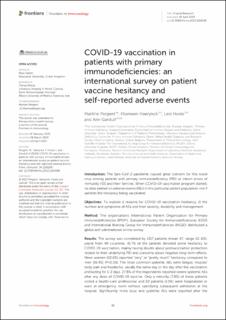| dc.contributor.author | Pergent, Martine | |
| dc.contributor.author | Haerynck, Filomeen | |
| dc.contributor.author | Hoste, Levi | |
| dc.contributor.author | Gardulf, Ann | |
| dc.date.accessioned | 2023-10-13T07:46:04Z | |
| dc.date.available | 2023-10-13T07:46:04Z | |
| dc.date.created | 2023-06-12T13:53:00Z | |
| dc.date.issued | 2023 | |
| dc.identifier.citation | Frontiers in Immunology. 2023, 14 . | en_US |
| dc.identifier.issn | 1664-3224 | |
| dc.identifier.uri | https://hdl.handle.net/11250/3096297 | |
| dc.description.abstract | Introduction: The Sars-CoV-2 pandemic caused great concern for this novel virus among patients with primary immunodeficiency (PID) or inborn errors of immunity (IEI) and their families. When COVID-19 vaccination program started, no data existed on adverse events (AEs) in this particular patient population, nor if patients felt hesitancy being vaccinated. Objectives: To explore i) reasons for COVID-19 vaccination hesitancy, ii) the number and symptoms of AEs and their severity, durability and management. Method: The organisations International Patient Organisation for Primary Immunodeficiencies (IPOPI), European Society for Immunodeficiencies (ESID) and International Nursing Group for Immunodeficiencies (INGID) distributed a global self-administered online survey. Results: The survey was completed by 1317 patients (mean 47, range 12-100, years) from 40 countries. 41.7% of the patients denoted some hesitancy to COVID-19 vaccination, mainly having doubts about postvaccination protection related to their underlying PID and concerns about negative long-term effects. More women (22.6%) reported “very” or “pretty much” hesitancy compared to men (16.4%) (P<0.05). The most common systemic AEs were fatigue, muscle/body pain and headache, usually the same day or the day after the vaccination and lasting for 1-2 days. 27.8% of the respondents reported severe systemic AEs after any dose of COVID-19 vaccine. Only a minority (7.8%) of these patients visited a health-care professional and 20 patients (1.5%) were hospitalized or seen at emergency room without specifying subsequent admission at the hospital. Significantly more local and systemic AEs were reported after the second dose. No differences regarding AEs were observed across different PID subgroups or vaccine types. Conclusion: At the time of the survey, almost half of the patients reported having felt hesitancy to COVID-19 vaccination highlighting the importance and need of developing joint international guidelines and education programs about COVID-19 vaccination. The types of AEs were comparable to healthy controls, but more frequent AEs were reported. Clinical studies and prospective, detailed registration of AEs related to COVID-19 vaccines in this patient population is of great importance. It is crucial to elucidate whether there is a coincidental or causal association between COVID-19 vaccine and some severe systemic AEs. Our data do not contradict that patients with PID can be advised to be vaccinated against COVID-19, in accordance with applicable national guidelines. | |
| dc.language.iso | eng | en_US |
| dc.rights | Navngivelse 4.0 Internasjonal | * |
| dc.rights.uri | http://creativecommons.org/licenses/by/4.0/deed.no | * |
| dc.title | COVID-19 vaccination in patients with primary immunodeficiencies: an international survey on patient vaccine hesitancy and self-reported adverse events | en_US |
| dc.title.alternative | COVID-19 vaccination in patients with primary immunodeficiencies: an international survey on patient vaccine hesitancy and self-reported adverse events | en_US |
| dc.type | Peer reviewed | en_US |
| dc.type | Journal article | en_US |
| dc.description.version | publishedVersion | |
| dc.source.pagenumber | 15 | en_US |
| dc.source.volume | 14 | en_US |
| dc.source.journal | Frontiers in Immunology | en_US |
| dc.identifier.doi | 10.3389/fimmu.2023.1166198 | |
| dc.identifier.cristin | 2153815 | |
| cristin.ispublished | true | |
| cristin.fulltext | original | |
| cristin.qualitycode | 1 | |

